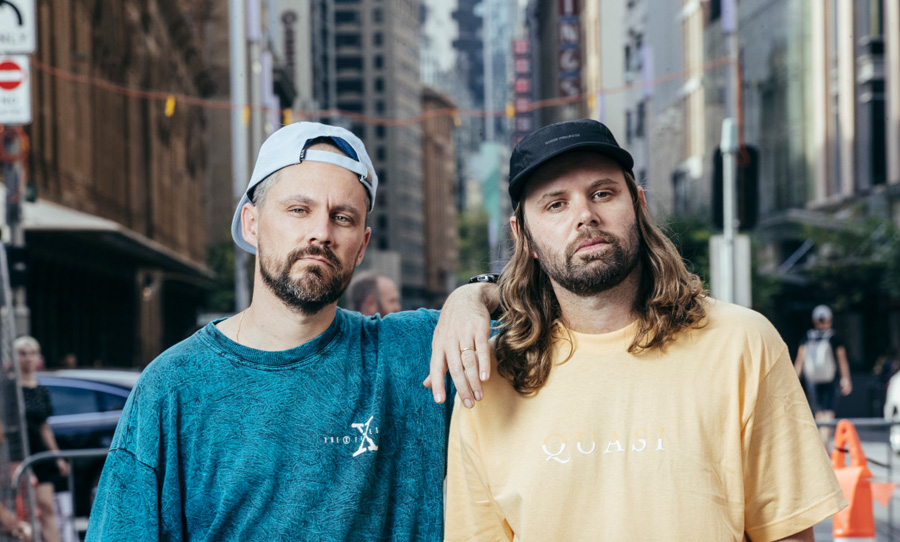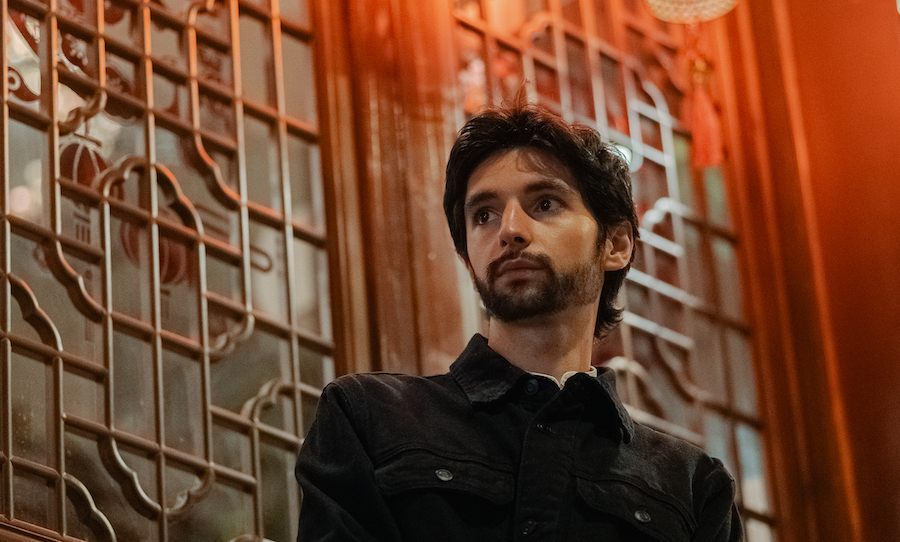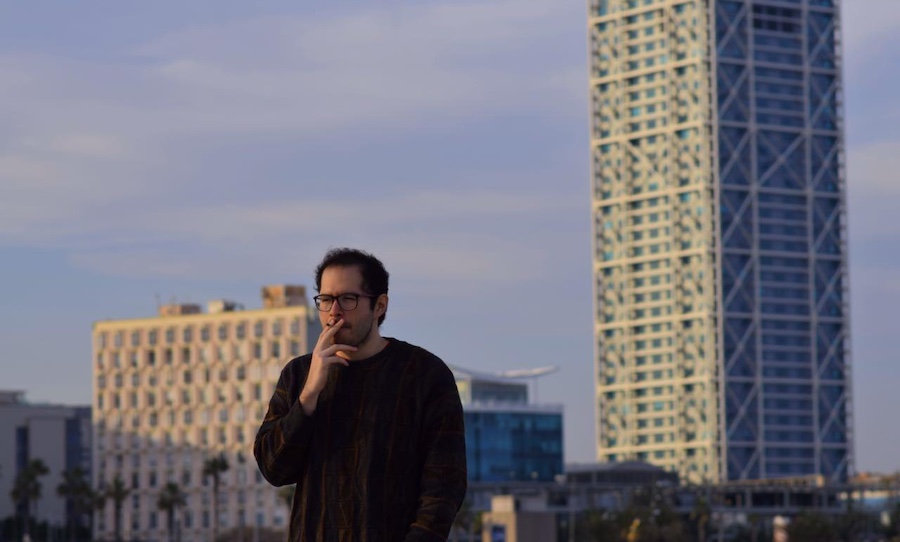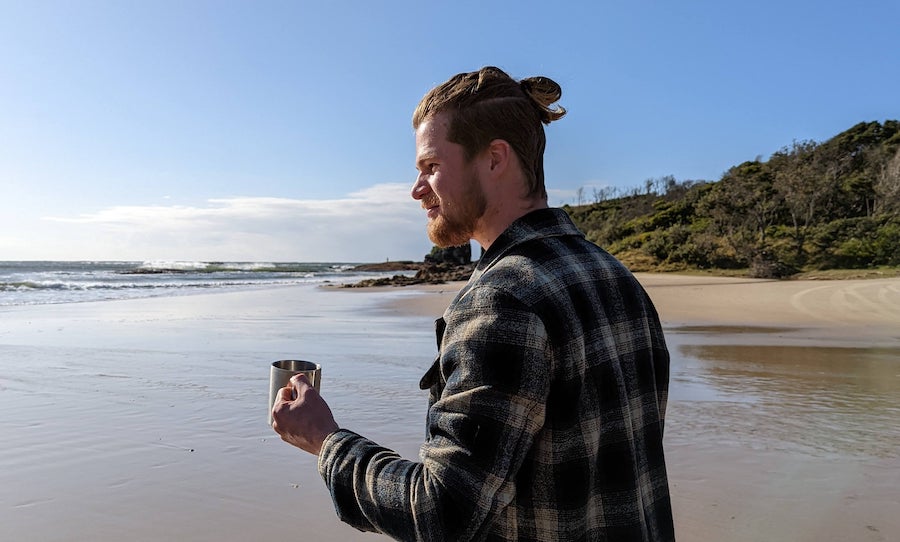Seven records into a stellar career, the Hermitude story is one of restless reinvention. We chatted about returning to their roots, choice gear, and their ever-evolving live show.
For a hip hop and electronic duo without a vocalist, Hermitude has carved out an incredible career. While they have enjoyed some massive collabs in recent years, their success has undoubtedly been built upon their ability to create otherworldly instrumental dimensions that evolve through rich, synthetic layers and samples.
We chatted with El Gusto (aka Angus Stuart) and Luke Dubs (aka Luke Dubber) about the production of their new (as yet unreleased) record, making the most of the gear that you have, and coming home in more ways than one.
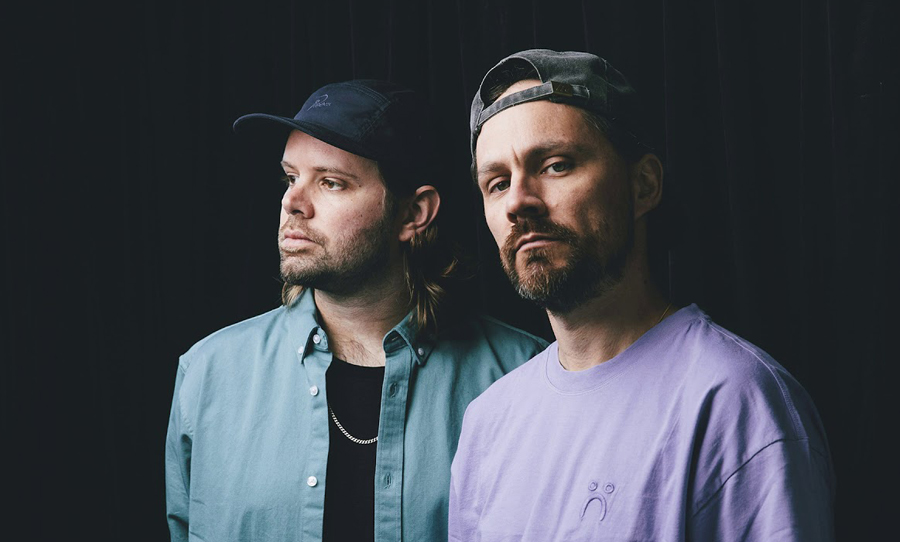
HAPPY: Can you describe your studio for us?
EL GUSTO: It’s in my house at Blackheath. I have a fairly small room that looks out over the treetops. Previously we were in Glebe, in what one might describe as a bunker with no natural light. When we moved back up here to the Blue Mountains, I immediately found the room with the most light and the best view and put a studio in there. It’s a fairly modest setup at the moment. It’s basically just my speakers and a bunch of analog synths and a bit of outboard gear, drum machines and stuff that we use the most for writing with.
We kept the setup minimal to get the most out of each machine, synth, or instrument. In our old studio, we had everything set up and there was a multitude of things to choose from, but for the writing of this next record, we decided to strip things down to the bare necessities to really try to get the most out of each instrument.
HAPPY: And are there any pieces that are really inspiring to you these days?
LUKE DUBS: The two synths that we’ve had set up for the past year are the Moog Matriarch and the Juno 6. They feature pretty heavily on this latest record, but the Juno 6 has probably featured more throughout our career than any other piece of equipment we’ve ever had. The Matriarch is the latest addition that we’re really vibing on. Those two have been the backbone of the record that we’re working on at the moment.
Years ago, we bought a Prophet 12, around the time that we were writing HyperParadise. We still use it, probably not as much these days, but that synth really fit in with that particular record and where we were at stylistically at the time, but the Matriarch is the new guy on the block that has fallen into the workflow quite easily.
EL GUSTO: I would say that it’s one of my favourite sounding synths that I’ve had in a long time. It’s a beautiful analog instrument that has its own kind of life, especially in the way that you can modulate it. It’s just a really ‘human’ kind of synthesizer. I fell in love with it straight away.
HAPPY: That’s the classic Moog thing right? Open-ended experimentation.
EL GUSTO: Exactly. It’s semi-modular, so you can patch things into different things and explode into these unique atmospheres and sounds. It’s a beautiful thing.
HAPPY: Over the years, you guys have had some pretty amazing vocal collabs, but a lot of the work has been instrumental too. How do you go about structuring evolving instrumental work, that doesn’t have a vocal in mind?
EL GUSTO: It’s a good question (laughs)!
HAPPY: I guess people are so attuned to hearing vocals in a track, so I’m just wondering, is there a ‘replacement’ for that missing element? Or does it force you to compose in an entirely different way?
LUKE DUBS: I don’t think it was ever purposeful. It was all we ever knew in the beginning. That was what we were listening to at the time. We were listening to a lot of hip hop and bands as well, but I guess the instrumental stuff came naturally to us, would you say, Gusto?
EL GUSTO: Yeah for sure. We played in bands together before Hermitude and they were instrumental bands. It’s just kind of where we came from. But we also recognise the beauty of a vocal because of the story it can tell and the focus it gives you in a song. But when it comes to instrumental music, we often refer to whatever that ‘lead’ part would be as the focus. It might just be a really beautiful, simple melody. And that, in essence, will be what a vocal does. It gives you a hook. Unless it’s like a slamming dance thing that has a big drop — then the drop becomes the hook of the song.
But with our more evolving stuff, there’s still the craft of ‘songwriting’ in there. We try to keep listeners engaged by having those ‘payoff’ moments. It might be a synth melody, or it might be a chopped up vocal sample that will engage you in that way.
HAPPY: In the last couple of records, especially in Dark Night Sweet Light and Pollyanarchy, there’s definitely a bigger vocal presence. Was that a deliberate change of direction, or did you simply have better access to collaborators?
LUKE DUBS: In Pollyanarchy, it was definitely a conscious decision. I guess we were heading that way, off the back of Dark Night Sweet Light. But Pollyanarchy was something that we wanted to do for a while, instead of focussing on instrumental music. Since we had some success with Dark Night Sweet Light, we were able to tee up some great sessions over here and in the States.
It was a really different exercise for us because we had to write Hermitude songs that maintained our identity but have vocals over the top. The danger is that you can lose a bit of your own identity when someone is telling their story over the top of your music, so that was one of the challenges of that record in particular. And it was difficult. There we times when we were thinking, “does this sound like a Hermitude record?” But I feel like I always come to those moments in the writing process where I’m like, “man, this record sounds so different.” But then two years later when it’s written, I listen back to it and I’m like, “of course it does.” Sometimes when you’re so deep in the process, you can’t really step back and listen from an outsider’s perspective.
Overall though, it was a really fun time. There are many fond memories. We went to LA and did a lot of writing camps just for ourselves. We’d book out a place for two weeks and have people coming in and we’d have four rooms running at the same time, it was really cool. Luckily we came out the other end with a record (laughs).
HAPPY: And for this upcoming record, has the approach been similar in terms of collaborations? And have you been able to do that in person, or has it been more remote?
EL GUSTO: It’s been absolutely different. The timing of this record has been crazy. Luke and I had booked some time to do a month of writing because we’d just come off the back of touring Pollyanarchy overseas and in Australia and we had our last shows in Japan in late February 2020. Covid was poppin’ off, everyone was wearing masks in Japan. Then we started checking the news from back home and we thought “are we gonna get back into the country?” And we just made it back in before they started closing borders.
So basically, everything shut down and we were just writing heaps of tunes and it just had this sense of space which you don’t usually get. We had all the time we wanted to just create some cool music. Going back to the Blue Mountains was an interesting thing for us. We’d both grown up in the Mountains, we made our first three records up here. Unfortunately, for a lot of people in the world, it was a terrible time, but for us, it was quite a creative time. We’ve written a lot of instrumental stuff again. There are still a few vocal collabs, but fewer than the last couple of records. It’s just me and Dubs again. It’s been a joy to write. There’s something to be said for that, seven records deep.
HAPPY: The history of Hermitude roughly lines up with the evolution of DAW-based production. Has that evolution affected your productions?
LUKE DUBS: For sure. Happily, we’re not old enough to be pre-DAW (laughs). I personally started out on Cubase version 1.0 on Atari ST in like 1993, but when I met Angus in the late ’90s, he was using Digital Performer, which is a MOTU software. We wrote four records —
EL GUSTO: Dark Night Sweet Light was on Digital Performer too.
LUKE DUBS: Shit! We wrote five records — most of our material — on Digital Performer. The process for writing music when we first got together is what you’d call archaic. Digital Performer with an AKAI S2000 sampler. There was this program called MISA, which was like a MIDI bridge between the sampler and the DAW —
EL GUSTO: Yeah, you could do basic editing of samples. The S2000 had eight outputs, so we were triggering that from the DAW via MIDI, then that was running into a 16 channel console and we’d just make tunes like that. Hardware-based, really. The DAW was just for triggering MIDI. Eventually, we’d record it back in and do some sort of vague mix on it. It was definitely a different process.
Now all you need is a laptop and a pair of headphones. People are making hit records like that, so the evolution of the DAW has been amazing. I love the fact that you can be in a car and write a song, or a train, or a plane, or whatever. I think it was around the end of HyperParadise that we started mucking around with Ableton. We installed it on our laptops, so when we were touring, we just started getting used to it. Writing beats on planes and stuff like that, just to get our head around it slowly, until we felt comfortable. We still did Dark Night Sweet Light on Digital Performer, but by the time that album finished, we were comfortable enough to start writing Pollyanarchy on Ableton. It’s really quick and creative.
HAPPY: And now that you’ve got all that horsepower, do you have to impose limitations to spark creativity?
LUKE DUBS: I guess that almost comes back to the first question because we limited our setup when we got back up here. We went from a big studio with a live room and a mixing room with 15 synths to 2 synths in a bedroom, basically. The possibilities are pretty much endless in a modern-day DAW. We have a lot of soft-synths that we love using and in-the-box processing, so the hardware is limited but the software is almost unlimited.
HAPPY: You’ll be back on stage later in the year for Festival of the Sun. How is the material shaping up for the live arena?
EL GUSTO: It’s cool man. We’ve literally been talking about it in the last couple of days, figuring out how we want to present the new material. We’ve been running the same setup for a long, long time, which is basically DJing backing tracks, then playing live synths and electronic drums over the top. We’re looking at this new record and seeing how we can evolve the live show to give it more space and time to be able to deconstruct songs, or extend them, and really give them a new lease of life. It’s partly because we want to give people a really cool experience, but also because we want to give us a really cool experience too (laughs)!
We’re pretty excited to break that down and build it back up again in a slightly new form. That will involve Ableton Live as well. We’ll have separated stems of songs and we’ll be able to extend certain sections and jam over the top. It’s in ‘idea’ mode at the moment, but we’ve got a few ideas up our sleeve that we’re pretty excited about.
Stay up to date with all the Hermitude news via their website. Catch their brand new live show at Festival of the Sun.
